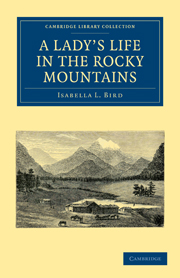Summary
Cheyenne, Wyoming, December 12.
The last evening came. I did not wish to realise it, as I looked at the snow-peaks glistening in the moonlight. No woman will be seen in the Park till next May. Young Lyman talked in a “hifalutin” style, but with some truth in it, of the influence of a woman's presence, how “low, mean, vulgar talk” had died out on my return, how they had “all pulled themselves up,” and how Mr. Kavan and Mr. Buchan had said they would like always to be as quiet and gentlemanly as when a lady was with them. “By May,” he said, “we shall be little better than brutes, in our manners at least.” I have seen a great deal of the roughest class of men both on sea and land during the last two years, and the more important I think the “mission” of every quiet, refined, self-respecting woman—the more mistaken I think those who would forfeit it by noisy self-assertion, masculinity, or fastness. In all this wild West the influence of woman is second only in its benefits to the influence of religion, and where the last unhappily does not exist the first continually exerts its restraining power. The last morning came. I cleaned up my room and sat at the window watching the red and gold of one of the most glorious of winter sunrises, and the slow lighting-up of one peak after another. I have written that this scenery is not lovable, but I love it.
- Type
- Chapter
- Information
- A Lady's Life in the Rocky Mountains , pp. 285 - 296Publisher: Cambridge University PressPrint publication year: 2009First published in: 1879

